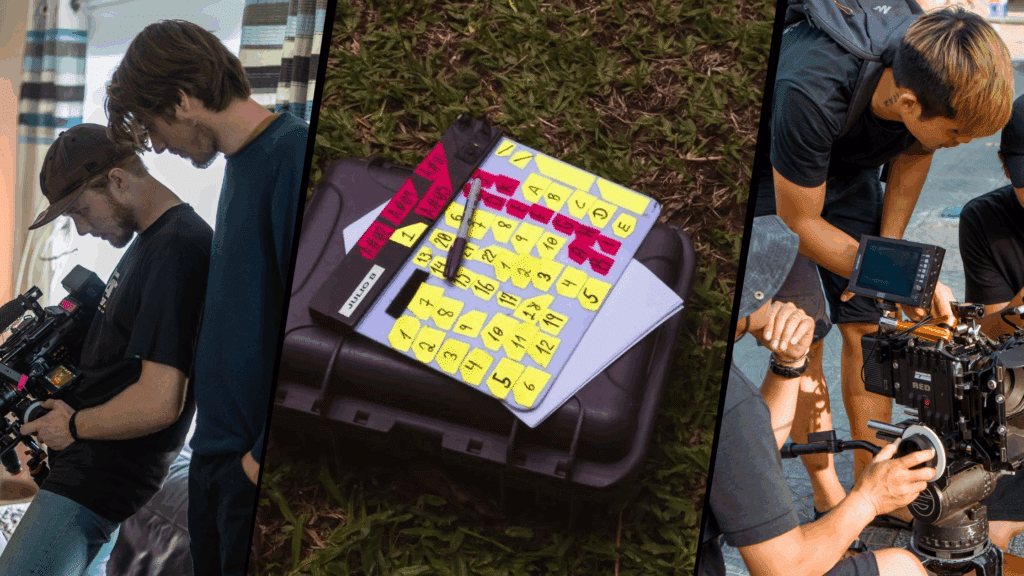
When the term ‘film crew’ comes to mind, you’d be forgiven for thinking actors, directors and producers. While these roles are often in the spotlight, there’s an entire team behind the scenes who ensure the production runs smoothly.
One crucial cog in this well-oiled machine is the Film Production Manager who work behind the camera and will seldom be found in the public eye. But without them, there would be no finished product.
Okay, so what does a Film Production Manager actually do? Well, we’re here to answer that very question, diving into the core responsibilities of a Film Production Manager and how you can become one.
Lights, camera, action…
In This Article
- What Is a Film Production Manager?
- Core Responsibilities on Set
- Production Manager vs. Line Producer
- Tools Production Managers Use
- How to Become a Film Production Manager
- Conclusion
- FAQ

What Is a Film Production Manager?
A Film Production Manager (PM) is a key administrative figure who oversees the organizational and logistical aspects of a film or TV show.
They typically will report to the Line Producer, making sure that a production stays on schedule and within budget. A bridge between the filmmaker’s creative vision and the production’s practical needs.
Film Production Managers are involved at nearly every stage of a production, from pre-production planning to post-production wrap up. You’ll often find them working out of the production office with frequent visits to set during filming to ensure things are all running according to plan.
There are multiple influences that help keep me on track to success. The people I have been lucky enough to collaborate alongside have sparked my love for the art of creation in the film industry, all the way from my earlier years in video production classes to the amazingly talented people I meet every day through my job, seeing how we can think outside the box further on an idea and create something not only original, but personal.
– Zachary Pierce (Director, Production Manager, Editor and Tour Manager) – Source: ShoutOutLA.com Interview
Streamline Your Production
Organize your team, call sheets, and schedules in one place with Celtx production tools.
Click here to start your free trial
Core Responsibilities on Set
So, what does a Film Production Manager do on set? They certainly wear many hats:
1. Budget Management
Filmmaking is a cash balancing game, so one of the Production Manager’s most critical tasks is to manage the budget. They track spending, forecast future expenses and make financial decisions along with the Line Producer and accounting team.
A film that goes way over budget could cost dearly at the end of the project and eat into the overall profits.
2. Scheduling
A successful film shoot relies on a meticulous and efficient schedule. The Production Manager oversees the production timeline, coordinates shoot dates, crew call times, equipment rentals and location availability.

3. Hiring and Coordination
The Production Manager also assists the various department heads with hiring crew members. Once crew members are hired, they are also the central point of call between different departments to make sure everyone is on the same page.
When shooting Star Trek III: The Wrath of Khan, it was essential that the crew were coordinated and aligned in what they wanted to achieve. Find out how they did just that, here.
4. Logistics
From booking travel and accommodation to securing permits and managing equipment rentals, the Production Manager manages it.
Once on set, the Production Manager will make sure everything is running as it should, liaising with the cast and crew to make sure they have all the equipment and resources they need to do their jobs.
They’ll also delegate tasks to the production team where required.
5. Problem Solving
Across all the responsibilities of the Production Manager, they must be flexible and adapt to new and ever-changing situations. On any set, unexpected issues can arise, from bad weather to scheduling conflicts, so the Production Manager must be ready to tackle them!
6. Compliance and Safety
The Production Manager ensures all legal and union regulations are followed, including labor laws, safety protocols, and insurance requirements.
Canadian Production manager, Ozzy Quiroz, walks you through the ins and outs of this role in the film industry in this video from the Reel Opportunities YouTube channel:
Production Manager vs. Line Producer
So, we’ve mentioned both a Production Manager and Line Producer so far. Are they the same role? If not, what’s the difference between them?
Some of their duties do overlap, but they are distinct positions within the production hierarchy.
The Line Producer is the top financial and logistical authority on a production. They are often the first person hired after a project is greenlit and are responsible for hiring the Production Manager
The Production Manager then works under the supervision of the Line Producer, executing their vision. While the Line Producer makes the high-level decisions, the Production Manager ensures these decisions are conducted on a day-to-day basis.

Tools Production Managers Use
With all the hats Production Managers wear, it’s no wonder they need various tools to manage the complex moving parts of a production.
Production Managers rely on a variety of tools and software to help them do their job. That’s where Celtx come in! Our all-in-one pre-production suite is designed to help filmmakers plan, organize, and manage projects. Plus, it’s ideal for Production Managers.
So, what do we offer?
- Scheduling tools (create shooting schedules, call sheets, and production calendars)
- Budgeting features (easily track expenses and manage line items)
- Collaboration capabilities (share documents and updates with cast and crew in real time)
- Script integration (break down scripts and link them directly to your schedule and budget)
To find out more about how Celtx can elevate your next production, click here.
Of course, there are a wealth of tools on offer for Production Managers, including:
- Movie Magic Budgeting and Scheduling
- StudioBinder
- Excel or Google Sheets (for custom solutions)
- Slack or Trello (for team communication and task management)
Build Better Call Sheets
Simplify communication with cast and crew using Celtx’s
easy-to-use call sheet templates.
Try Celtx for free
How to Become a Film Production Manager
If everything we’ve talked about so far seems like the perfect role for you and something you’d consider moving into, then you’re in the right place.
Becoming a Production Manager in film involves a mix of education, experience, and networking (our favorite word!). Remember, everyone’s journey into the film and television industry is different, but here is a general roadmap to becoming a Production Manager:
Education
While not always required, a degree in film production, communications or business can build a solid foundation for the responsibilities you’ll take on as a Film Production Manager.
Not sure if a film degree is the right path for you? Check out our article here.

Experience
Practical experience and ‘learning on the job’ will show you the ins and outs of the Production Manager role. Start with entry-level roles like Production Assistant (PA) or Coordinator.
These positions offer firsthand experience and insight into not just the role of the Production Manager, but the workings of a film set overall. Understanding the logistics of how a film set operates will be invaluable.
Networking
Ah, our favorite word! If you read our blog often, you’ll know how much we love networking, and it’s for good reason.
The film and television industries thrive on relationships. Building a tribe of filmmakers around you is crucial, and not just those higher up in the hierarchy. Meet and connect with those at the same stage of their career as you
Strong interpersonal skills are crucial. You interact with crew members at every level, often under pressure. You need to juggle multiple responsibilities while keeping a level head. Most people work their way up through the production office – starting as a runner, then moving through roles like secretary, assistant coordinator, coordinator and finally production manager. But you can also transition from locations or AD roles. – Joanna Osborn (Production Manager on House of the Dragon)
Source: Interview with RTS
Attend industry events, join film organizations, and connect with professionals through social media and internships.

Skill Development
Production Managers need to be good organizers and communicators if they’re going to be dealing with multiple crew and cast members. Strong organizational, financial, and communication skills are essential!
Also make sure to familiarize yourself with industry standard tools, like Celtx and Final Draft, so you’re in the know. Software and hardware are also updated often, so even when you’re confident in the role, you’ll need to make sure you refresh your knowledge on a regular basis.
Certifications and Training
If you feel you do need a refresher on some of the above core skills, there are workshops and courses on offer that focus on budgeting, scheduling or safety compliance.
Assistant Director and Production Manager Terry Bamber talks about his experiences and building a career in the film industry in this interview with the University of Derby:
It’s interesting that Terry is both an AD and PM, but it is common for film professionals to diversify as they gain more experience. Depending on the film set and production needs, Terry’s role could change.
VFX Production Manager Sakshi Gaur also gave this amazing advice for aspiring Production Managers:
Before going straight into managing, try to listen and understand the work from the aspect of the artist. Be on your teams’ toes, know what’s going with everyone and every shot. Be proactive! – Sakshi Gaur (VFX Production Manager)
Source: Interview with Outpost-VFX
Conclusion
A Film Production Manager is the unsung hero of the film world, balancing art with logistics. Their role is vital in turning a creative concept into a tangible, watchable product.
From managing budgets and schedules to coordinating teams and solving on-set problems, the PM is essential to the overall production process. If you’re someone who thrives in fast-paced, meticulous environments and love both film and problem-solving, this career path may just be for you. It can be extremely rewarding and fulfilling if you’re willing to work hard for it!
Good luck!
Whether you’re producing a short film or managing a full-scale shoot, the right tools make all the difference.
Click here to explore Celtx for production teams
FAQ
What is a production manager in film?
A production manager in film oversees the logistical and administrative aspects of a film production. They ensure everything runs smoothly, on time, and within budget.
What is the role of a production manager?
The role of a production manager includes managing the movie budget, organizing schedules, hiring crew, managing logistics, solving on-set problems, and ensuring everyone is safe and the set is compliant with health and safety.
What is the difference between a producer and a production manager?
A producer engages in both the creative and financial aspects of a movie, often from development all the way through to distribution. On the other hand, a production manager focuses specifically on the practical execution during production.
What is production management in film industry?
Production management involves planning, coordinating, and overseeing the logistical elements of a film production, ensuring that all operations align with both the creative vision and budgetary constraints.
Explore more jobs in the film industry:
- What is a Cinematographer, and What Do They Do?
- How to Become a Script Reader: 7-Step Guide
- What Does a Producer Do? (In Film)
